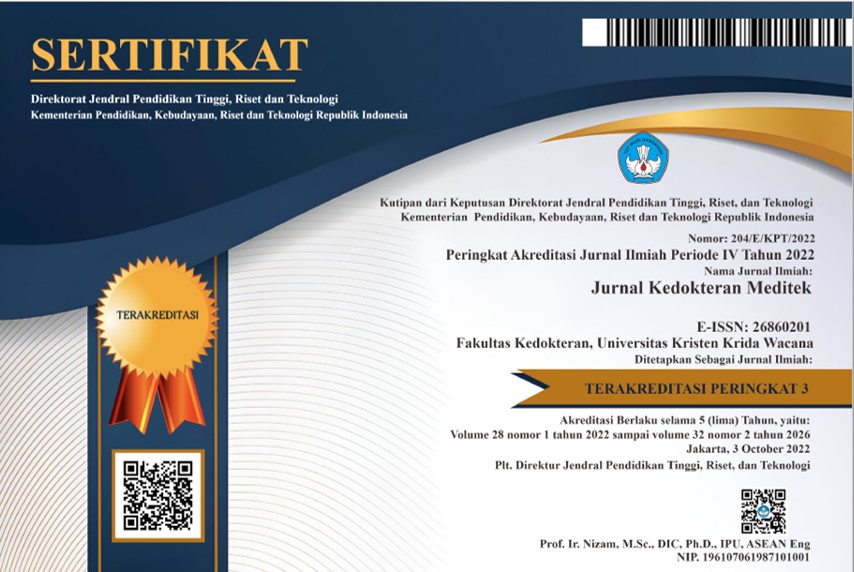Paradoxical Reaction in Tuberculous Meningitis and Tuberculoma: Diagnostic Challenges Following Incomplete Treatment
DOI:
https://doi.org/10.36452/jkdoktmeditek.v31i6.3856Keywords:
meningitis, paradoxical reaction, tuberculoma, tuberculosisAbstract
Introduction: Exacerbation of clinical or radiological findings in tuberculous meningitis (TBM) may result from a paradoxical reaction (PR), an immune-mediated response occurring in 6–30% of cases during or after anti-tuberculosis treatment (ATT). This case highlights the potential for PR to occur in the context of an incomplete ATT regimen. Case Illustration: A 20-year-old female presented with a 1-month history of headache, fever, double vision, nuchal rigidity, and bilateral abducens palsy. Cerebrospinal fluid analysis revealed pleocytosis and elevated protein, while brain MRI demonstrated leptomeningeal enhancement with multiple tuberculomas. She received standard ATT (RHZE), but discontinued therapy before completion due to symptom resolution and medication burden. One year later, she developed altered sensorium and behavioral changes; MRI showed new tuberculomas with edema despite negative serology. A diagnosis of PR was made, and high-dose intravenous corticosteroids were administered, resulting in clinical and radiological improvement. Discussion: PR remains a diagnostic challenge, often mistaken for microbiological relapse, drug resistance, or treatment failure. It arises from a distinct immune response to mycobacterial antigens, distinguishing it from relapse or drug resistance. Conclusion: Clinicians should suspect PR in worsening TBM cases, even in the setting of incomplete ATT, to prevent misdiagnosis and initiate prompt treatment.
References
Cheng VC, Yam WC, Woo PC, et al. Risk factors for development of paradoxical response during antituberculosis therapy in HIV-negative patients. Eur J Clin Microbiol Infect Dis. 2003 [cited 2025 April 16];22(10):597–602. Available from: https://doi.org/10.1007/s10096-003-0998-z
Singh AK, Malhotra HS, Garg RK, et al. Paradoxical reaction in tuberculous meningitis: Presentation, predictors and impact on prognosis. BMC Infect Dis. 2016 [cited 2025 April 16]; 16:306. Available from: https://doi.org/10.1186/s12879-016-1625-9
Bell LCK, Breen R, Miller RF, Noursadeghi M, Lipman M. Paradoxical reactions and immune reconstitution inflammatory syndrome in tuberculosis. International Journal of Infectious Diseases. 2015 [cited 2025 April 16]; 32:39–45. Available from: https://doi.org/10.1016/j.ijid.2014.12.030
Garg RK, Malhotra HS, Kumar N. Paradoxical reaction in HIV negative tuberculous meningitis. J Neurol Sci. 2014 [cited 2025 April 16]; 340:26–36. Available from: https://doi.org/10.1016/j.jns.2014.03.025
Meintjes G, Lawn SD, Scano F, Maartens G, French MA, Worodria W, et al. Tuberculosis-associated immune reconstitution inflammatory syndrome: case definitions for use in resource-limited settings. Lancet Infect Dis. 2008 [cited 2025 April 16]; 8:516–23. Available from: https://doi.org/10.1016/S1473-3099(08)70184-1
Hejazi N, Hassler W. Multiple intracranial tuberculomas with atypical response to tuberculostatic chemotherapy: Literature review and a case report Infection. 1997 [cited 2025 April 17]; 25:233–9. Available from: https://doi.org/10.1007/BF01844751
Dhaliwal U, Monga P. Paradoxical reaction in tubercular meningitis resulting in involvement of optic radiation. Indian Journal of Ophthalmology. 2009 [cited 2025 April 17];57(2):139. Available from: https://doi.org/10.4103/0301-4738.45504
Park K, Cho O, Chong Y, Lee S, Choi S, Jeong J, et al. post-therapy paradoxical response in immunocompetent patients with lymph node tuberculosis. J Infect. 2010 [cited 2025 April 17]; 61:430–4. Available from: https://doi.org/10.1016/j.jinf.2010.08.011
Hermans SM, Akkerman OW, Meintjes G, Grobusch MP. Post-tuberculosis treatment paradoxical reactions. Infection. 2024 [cited 2025 April 17];52(5):2083–95. Available from: https://doi.org/10.1007/s15010-024-02310-0
Cheng V, Ho P, Lee R, Chan K, Chan K, Woo P, et al. Clinical spectrum of paradoxical deterioration during antituberculosis therapy in non-HIV-infected patients. Eur J Clin Microbiol Infect Dis. 2002 [cited 2025 April 17]; 21:803–9. Available from: https://doi.org/10.1007/s10096-002-0821-2
Robledo-Gil T, Harada K, Ikuta I, Villanueva M. Paradoxical Reaction in a Patient with Co-Occurring Tuberculous Meningitis and Pott's Disease. Am J Case Rep. 2018 [cited 2025 April 17]; 19:699-704. Available from: https://doi.org/10.12659/AJCR.909194
World Health Organization (WHO). World Health Organization [Internet]. Geneva: WHO; c2024 [cited 2025 Apr 17]. Available from: https://www.who.int/
Nicolls DJ, King M, Holland D, Bala J, del Rio C. Intracranial tuberculomas developing while on therapy for pulmonary tuberculosis. The Lancet Infectious Diseases. 2005 [cited 2025 April 17];5(12):795–801. Available from: https://doi.org/10.1016/S1473-3099(05)70299-1
Yamada A, Ishihara T, Amano E, Otsu S. Late-onset paradoxical reactions 10 years after treatment for tuberculous meningitis in an HIV-negative patient: a case report. BMC Infect Dis. 2018 [cited 2025 Nov 5]; 18:313. Available from: https://doi.org/10.1186/s12879-018-3229-z
Thevarajah R, Chang T. Paradoxical reaction in the treatment of tuberculous meningitis – pitfalls and challenges. Sri Lanka J Neurol. 2023 [cited 2025 Nov 5];11(2):42–45. Available from: https://doi.org/10.4038/sljon.v11i2.180
Barr DA, Coussens AK, Irvine S, Ritchie ND, Herbert K, Choo-Kang B, et al. Paradoxical upgrading reaction in extra-pulmonary tuberculosis: Association with vitamin D therapy. The International Journal of Tuberculosis and Lung Disease. 2017 [cited 2025 April 17];21(6):677–83. Available from: https://doi.org/10.5588/ijtld.16.0927
Garg RK, Paliwal V, Malhotra HS. Tuberculous optochiasmatic arachnoiditis: a devastating form of tuberculous meningitis. Expert Rev Anti Infect Ther. 2011 [cited 2025 Apr 17];9(9):719–29. Available from: https://doi.org/10.1586/eri.11.93
Tai MLS, Nor HM, Kadir KAA, et al. Paradoxical manifestation is common in HIV-negative tuberculous meningitis. Medicine (Baltimore). 2016 [cited 2025 Apr 17];95(1): e1997. Available from: https://doi.org/10.1097/MD.0000000000001997
Gupta M, Bajaj BK, Khwaja G. Paradoxical response in patients with CNS tuberculosis. J Assoc Physicians India. 2003 [cited 2025 April 17]; 51:257–60.
Geri G, Passeron A, Heym B, Arlet J-B, Pouchot J, Capron L, et al. Paradoxical reactions during treatment of tuberculosis with extrapulmonary manifestations in HIV-negative patients. Infection. 2012 [cited 2025 April 17];41(2):537–43. Available from: https://doi.org/10.1007/s15010-012-0376-9
Downloads
Published
How to Cite
Issue
Section
License
Copyright (c) 2025 Rocksy Fransisca V. Situmeang, Nadia Gabriella

This work is licensed under a Creative Commons Attribution-ShareAlike 4.0 International License.

















